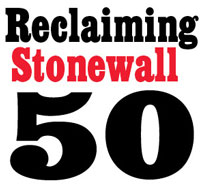 In the Middle East, queer Arabs are expected to remain silent about who we are. Yet it was the city of Beirut that opened my eyes to the power of queerness and helped me find my voice.
In the Middle East, queer Arabs are expected to remain silent about who we are. Yet it was the city of Beirut that opened my eyes to the power of queerness and helped me find my voice.
I set foot in Lebanon for the first time during my junior year of college as a study abroad student at the American University of Beirut, overlooking the Mediterranean Sea. It was in Beirut that I discovered Helem (Dream), the first LGBTQ organization in the Arab world, which enabled me to make dear friends, whom I return to visit in Beirut every year. It is also where I met my Lebanese ex.
That semester with my ex was one of my first experiences with genuine love. He lived at home and wasn’t out to his traditional Christian family. We often spent evenings there with them for meals, watching films, playing cards, and talking about life. When it would get late, his parents, whom I adored, would insist that I spend the night at their home, rather than return to my dorm in a different part of the city.
We ultimately broke up because we were young, and because his life was based in Lebanon, and mine in the United States. We cut off contact because it was too painful to be in touch, and we wanted to move on.
We have spoken only once since then. He called to inform me that his father passed away in the midst of surgery. He told me that he sat beside his father on the hospital bed before the operation and that his father turned to him and said, “Remember your friend Sa’ed? He was very special to you. I want you to know that your mother and I knew exactly what he meant to you and how happy you made each other. I hope you two will reconnect—and that you will remember that your parents bless this.”
I was speechless.
Years later, during one of my recent trips to Beirut, I went out dancing with a group of friends for my last night in town. While dancing, we spotted my Lebanese ex in the venue.
He did not see me, and I found it too difficult to approach him. I just kept dancing, though there was a melancholy that consumed me. At the same time, I looked at him and the many beautiful LGBTQ Arabs dancing all around us, and my heart smiled, remembering his father.
I share this story because straight people are often so comfortable narrating their experiences with love and heartbreak without fearing for their lives.
It is our turn.
I want young LGBTQ Arabs in particular to know that it is possible for your family to love you unconditionally. Certainty, there will be ups and downs, and twists and turns along the way, but it is possible to dance the night away while being yourself in an Arab capital. I’m grateful to Beirut—and my ex and his family there—for teaching me these lessons and so much more.
Every day, courageous LGBTQ activists in Beirut have worked tirelessly to make the city more hospitable to queer people. Beirut has become the hub of the first public Pride celebrations in the Arab region. Activists have also celebrated the declarations by the Lebanese Psychiatric Society and the Lebanese Psychological Association affirming that homosexuality is not an illness. This was unprecedented for the mental health community in the Arab world. LGBTQ activists in Beirut have also won multiple legal decisions from Lebanese courts ruling that homosexuality is not illegal, even as they continue to lobby to repeal the French colonial law in Lebanon that criminalized homosexuality.
The challenges ahead for Arab LGBTQ communities are formidable, but the victories inspire hope. It is time to recognize this history.


